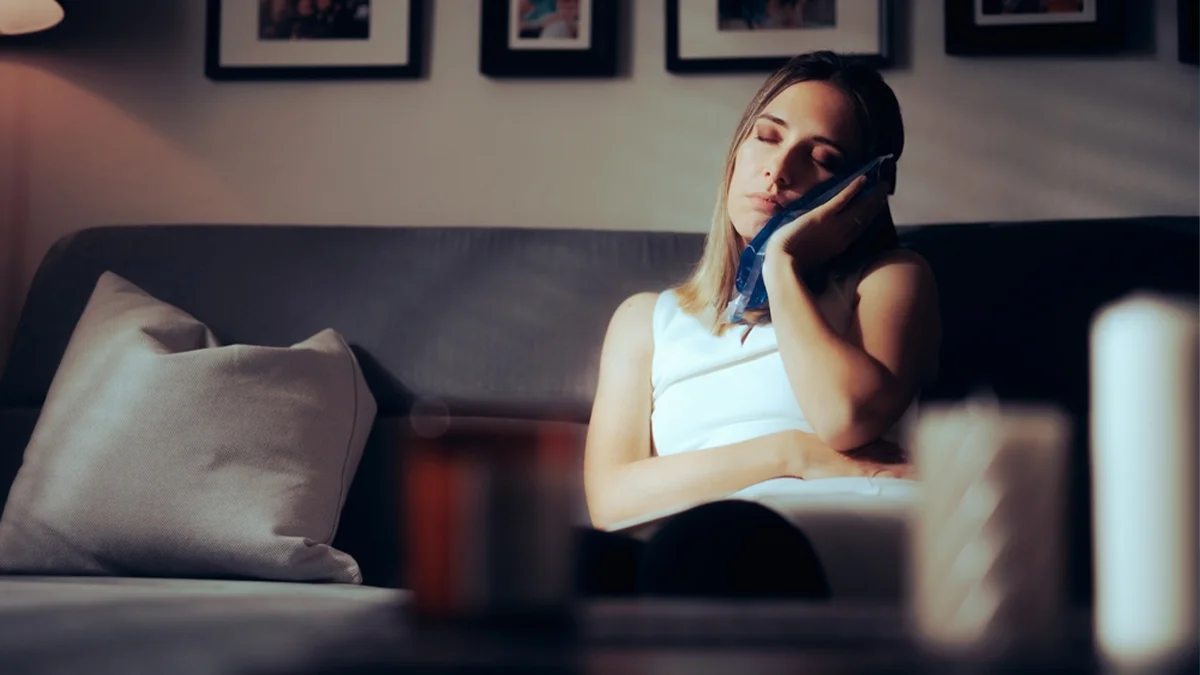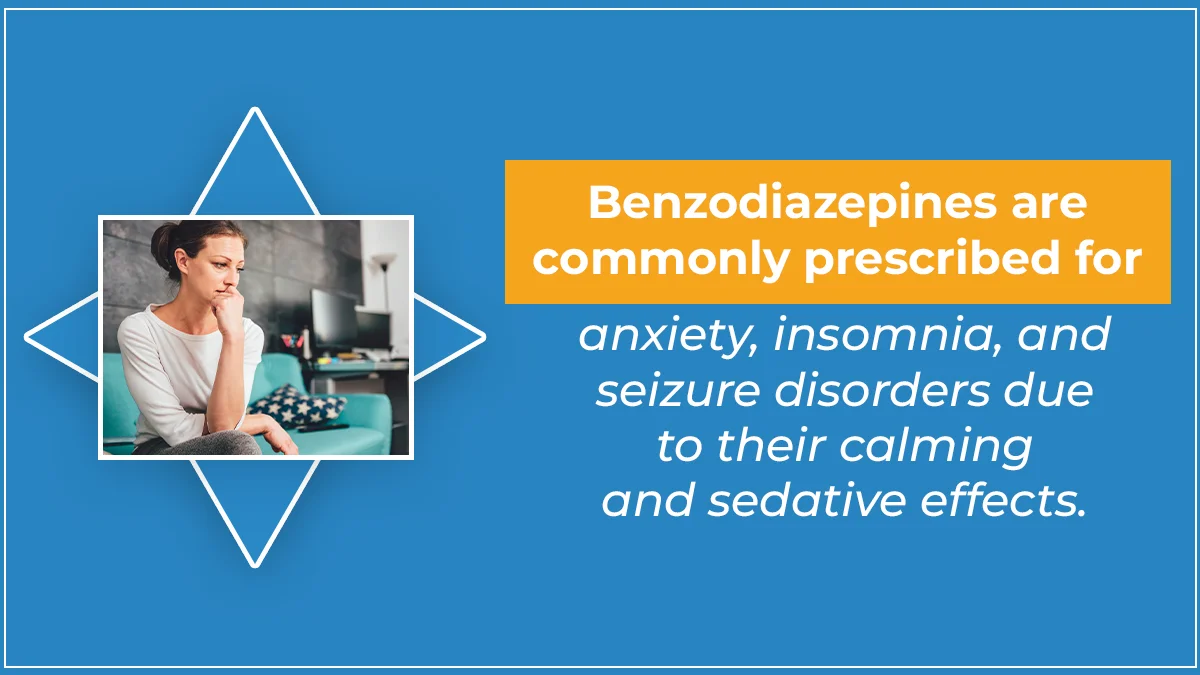Benzodiazepines: Uses, Effects, and Addiction
Benzodiazepines are a class of medications widely prescribed to treat conditions like anxiety, insomnia, and seizures. They come in various forms, such as tablets, capsules, and liquids. Doctors usually suggest them for short-term use due to their potential for addiction.
Keep reading to learn more about benzodiazepine medications, how they can be used, and their potential for abuse.
Key Takeaways
Benzodiazepines are prescription drugs that, like any other medication, come with adverse effects and risks. Here is what you need to know:
- Common benzodiazepines like Xanax and Valium treat anxiety and sleep disorders by enhancing calming effects in the brain.
- Benzos can cause various physical and psychological side effects, while overdose and dependence are potential risks.
- Effective management of benzodiazepine withdrawal involves different approaches, such as medically supervised detox.
The Recovery Team offers personalized support and guidance in overcoming substance use disorders (SUDs). Call (800) 817-1247 for more information.
What are Benzodiazepines?
Benzodiazepines, also referred to as benzos, are a class of psychoactive drugs that exert their effects on the central nervous system (CNS). Doctors commonly prescribe them for various medical conditions due to their ability to produce sedative, hypnotic, anxiolytic, muscle relaxant, and anticonvulsant effects.
The most commonly prescribed medications include:
- Alprazolam (Xanax): Often prescribed for managing symptoms of anxiety and panic attacks.
- Diazepam (Valium): Used for anxiety, muscle spasms, and seizures.
- Lorazepam (Ativan): Typically prescribed for anxiety disorders and acute anxiety episodes.
- Clonazepam (Klonopin): Used to treat seizures, panic disorder, and certain movement disorders.
- Temazepam (Restoril): Primarily prescribed for insomnia.
- Oxazepam (Serax): Prescribed for anxiety and alcohol withdrawal.
- Chlordiazepoxide (Librium): Used for anxiety and alcohol withdrawal symptoms.
- Clorazepate (Tranxene): Prescribed for anxiety disorders.
- Flurazepam (Dalmane): Primarily used for insomnia.
- Midazolam (Versed): Often used in medical settings for sedation and anesthesia.
These drugs enhance the effects of a neurotransmitter called gamma-aminobutyric acid (GABA) in the brain. GABA is responsible for calming nerve activity, so when benzos calm nerve activity, they promote relaxation, reduce anxiety, induce sleep, and relax muscles or prevent seizures.
However, it’s important to note that while benzodiazepines can be highly effective in the short term, their long-term use is not recommended due to the higher risk of dependence, tolerance, and potential for withdrawal symptoms. Therefore, their use should be closely monitored by healthcare providers.
Side Effects of Benzodiazepines
Different benzodiazepines, commonly prescribed for anxiety and sleep disorders, can bring relief to many individuals. However, like any medication, they may also have side effects that need careful consideration.
Physical Side Effects
Physically, benzodiazepines can lead to drowsiness, dizziness, and problems with coordination. These medicines may cause individuals to feel sleepy or tired during the day, impacting their ability to focus or perform tasks that require alertness.
Some people may experience blurred vision or have difficulty controlling their movements, which could increase the risk of accidents or falls. Additionally, benzodiazepines might affect the digestive system, leading to symptoms like nausea, constipation, or changes in appetite.
Psychological Side Effects
Apart from physical effects, benzodiazepines might also influence emotional and mental health. They can cause confusion or memory problems, affecting one’s ability to recall recent events or concentrate on tasks. Some individuals might feel irritable or experience mood swings.
In some instances, benzodiazepines might even induce paradoxical reactions, leading to increased anxiety, restlessness, or aggression. Sleep disturbances or vivid dreams might also occur due to these medications affecting the sleep cycle.
While not everyone experiences all these effects, knowing the range of possible physical and psychological reactions can help individuals recognize and manage any adverse experiences.
Risk of Dependence and Addiction to Benzos
Benzodiazepine medications also carry a significant risk of dependence and addiction, especially when used regularly or for an extended period. Here is how the use of benzodiazepine can lead someone down the path of addiction:
Regular Use and Tolerance
Initially, individuals may be prescribed benzos for short-term relief from acute symptoms. However, regular use of benzodiazepines can lead to the development of tolerance, where the body becomes adapted to the drug’s effects. As tolerance increases, individuals may find themselves needing higher doses to achieve a similar level of relief, setting the stage for potential dependency.
Development of Dependence
With continued drug abuse, especially over an extended period, the risk of developing dependency grows. Dependence occurs when the body adapts to the presence of the drug, and abrupt cessation can lead to withdrawal symptoms. Physical and psychological dependence on benzos may result in individuals feeling unable to cope without the medication, leading to a cycle of continued use.
Full-Blown Addiction
With long-term use of benzodiazepines, dependency can progress to full-blown addiction. Individuals not only start relying on benzos to function but also experience intense cravings and loss of control over their use. Addiction can have profound effects on one’s personal, professional, and social life. The pursuit of obtaining and using benzos may become all-consuming, often at the expense of other responsibilities and activities.
Given the dependency and addiction risks, benzodiazepine should only be used for short-term treatment, and that too under the supervision of health professionals.
Risk of Benzo Withdrawal and Overdose
Withdrawing from benzodiazepines can pose challenges, including potential withdrawal symptoms, while an overdose can lead to severe health complications.
Benzodiazepine Withdrawal
When someone stops taking benzodiazepines suddenly after long-term use, they may experience withdrawal symptoms. These symptoms can vary in intensity and duration depending on factors like the dosage, duration of use, and individual physiology. Withdrawal symptoms may include:
- Anxiety
- Irritability
- Insomnia
- Tremors
- Sweating
- Difficulty concentrating
- Nausea or vomiting
- Increased heart rate
- Seizures (in severe cases)
Withdrawal from benzodiazepines can be dangerous, especially when attempted without medical supervision. Tapering off the medication gradually under a doctor’s guidance is typically recommended to minimize the risk of severe withdrawal symptoms.
Benzodiazepine Overdose
Benzo overdose can occur when someone takes more than the prescribed amount or uses them recreationally. Signs of a benzodiazepine overdose may include:
Extreme drowsiness or loss of consciousness
- Confusion
- Slurred speech
- Slow or shallow breathing
- Blurred vision
- Weakness
- Coma (in severe cases)
- Death (in extreme cases, especially when combined with central nervous system depressants like alcohol or opioids)
In case of a suspected benzodiazepine overdose, immediate medical attention is crucial. Calling emergency services or taking the person to the nearest emergency room is vital for prompt treatment and care.
Managing Benzodiazepine Withdrawal
Managing benzodiazepine withdrawal requires a comprehensive approach that addresses both the physical and psychological aspects of addiction. Here are effective strategies for navigating this challenging journey toward recovery:
Medical Detoxification
Medical detoxification, often the first step in withdrawal management, involves gradually tapering off the benzodiazepine dosage under the supervision of healthcare professionals. This controlled reduction minimizes severe withdrawal symptoms and ensures the individual’s safety during the process.
Rehabilitation Programs
Rehabilitation programs offer tailored approaches to recovery. Inpatient programs provide immersive, 24/7 care for severe cases, offering a structured environment and constant medical supervision. Outpatient programs provide flexibility for those with less severe addiction, allowing individuals to receive treatment while maintaining daily responsibilities.
Medications
Certain medications, such as anticonvulsants or beta-blockers, may be prescribed to manage specific withdrawal symptoms like seizures or high blood pressure. Additionally, medicines aiding in anxiety or sleep disturbances during withdrawal can be used cautiously and under medical guidance.
Counseling and Therapy
Counseling and therapy play a vital part in benzodiazepine withdrawal management. Behavioral therapies, such as cognitive-behavioral therapy (CBT) or dialectical behavior therapy (DBT), help individuals develop coping mechanisms, manage triggers, and address underlying issues contributing to benzodiazepine use.
Support Groups
Engaging in support groups, such as 12-step programs or peer support groups, can provide a sense of community and understanding during benzodiazepine withdrawal. Support groups offer a platform for individuals to share personal experiences, gain support, and learn from others going through similar challenges.
Healthy Lifestyle Changes
Incorporating healthy lifestyle changes can complement benzodiazepine withdrawal efforts. These changes may include regular exercise, balanced nutrition, adequate sleep, and stress-reducing activities like meditation or yoga. Creating a supportive environment that fosters overall well-being can aid the withdrawal process.
By combining these benzodiazepine treatment approaches, individuals can navigate withdrawal more effectively and increase their chances of successful recovery.
The Recovery Team: Building Bridges to Wellness
The Recovery Team is here to guide you toward a drug-free life.
Our personalized rehab programs are tailored to meet your unique needs, ensuring a full continuum of care. From evidence-based therapies to expert medication management and holistic approaches, we’re here to help you break free from the chains of addiction.
Call us now at (800) 817-1247 to take that first step toward a drug-free life.






